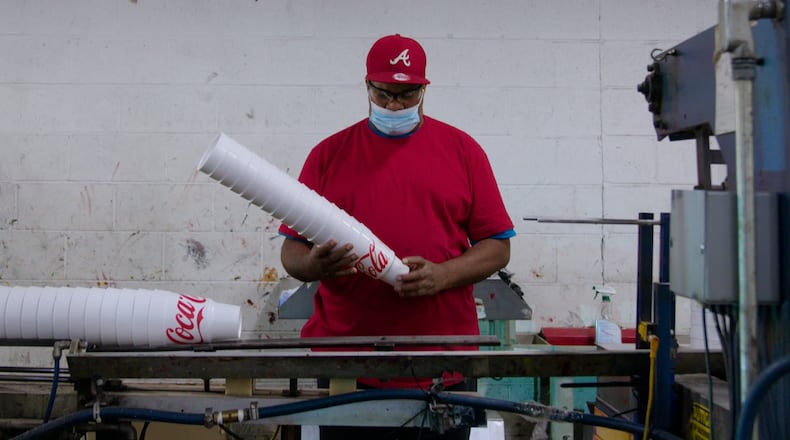Metro Atlanta last year added 126,400 jobs, accounting for most of the new jobs in Georgia, as the unemployment rate dipped to a historic low, the state’s Department of Labor reported Thursday.
The region finished the year with an above-average December, adding 5,400 jobs, nudging the unemployment rate down from 2.7% in December to 2.6% for the year — equaling the lowest rate of the late 1990s boom.
While the national economy has been solid, the picture here is even brighter, said Bruce Thompson, the state’s labor commissioner. “We are well-positioned to help businesses remain competitive and find top-tier talent.”
Access to skilled labor has been a key to Atlanta’s expansion and will continue to be crucial to economic growth, said economist Jeff Humphreys, director of the Selig Center for Economic Growth at the University of Georgia.
While several smaller metros — especially Savannah — are thriving, dominant Atlanta came through the pandemic with even greater importance to the state’s overall success as ever before.
“Atlanta has been an economic development success,” he said. “It has an educated workforce, it’s an innovation and tech hub and it has higher-than-average population growth. And all those things are related.”
During the month, metro Atlanta added jobs in a number of sectors — including real estate, where a dip in mortgage rates boosted sales after months of decline — but also logistics, hospitality and health care.
Consumer demand has remained solid. Arden’s Garden, an Atlanta-based juice manufacturer, for example, has 180 employees and is hiring for a number of positions, according to Leslie Zinn, chief executive of the company.
Atlanta’s job base has grown despite a slew of layoffs at tech companies, including Greenlight Financial, Google, Microsoft, Salesforce, Twitter, Meta, Lyft and Amazon.
Those companies have been tight-lipped about how many cuts would come in Atlanta. But even if there are layoffs here, some of that impact is delayed since workers who receive a severance package can’t file for unemployment benefits until the severance is exhausted.
Moreover, there is still demand for techies at other companies, including the new and ambitious entrants into the electric vehicle sector. For instance, the state Thursday announced plans for SK Battery America to open a regional tech hub in Roswell, creating 200 jobs.
Atlanta has also benefitted from being one of the nation’s leading metros for staring new businesses, according to Yelp, which collects and analyzes millions of reviews nationally.
The top three categories for new businesses in the region in the past year were beauty services, arts and entertainment and hotels and travel companies, according to Yelp.
In the past three years, the state’s job base has expanded by 3.9% while metro Atlanta’s has burgeoned by 6.1%, according to the Bureau of Labor Statistics. In the past year, Atlanta accounted for more than 80% of the state’s new jobs.
Some Georgia metros, like Columbus, have lost jobs. The hottest growth outside Atlanta has been around Savannah — where rapid expansion of the port has fueled near-frantic development — and Athens, where the massive state university is a growth engine.
But progress is not inevitable. And the past year’s progress has come against the headwinds of higher interest rates as the Federal Reserve made borrowing more costly in its fight against inflation.
That campaign will likely chill spending enough to tip the economy into a downturn later this year, Humphreys said. “You hit the economy over the head enough with higher interest rates and you get a recession.”
If there is a recession, the impact will not be spread evenly, Humphreys said.
Growth in Atlanta will likely slow, but continue, he said. In contrast, the area around Dalton — a national center for the flooring industry — will suffer, since its business depends so heavily on providing products for new homes.
“And the housing market is already in recession,” Humphreys said.
Still, those rates haven’t turned the economy around yet. The national economy grew at a stronger-than-expected 2.9% clip in the fourth quarter of last year, the Bureau of Labor Statistics reported Thursday.
Many local companies are still hiring.
That growth has continued even as short-term rates, cut to near zero early in the pandemic, have risen above 4% and are expected to go higher in coming months.
“Historically, that is not bad, not that high, but it is completely different than zero,” said Michael Winters, president of Stone Mountain-based WinCup, which makes biodegradable materials for food service companies.
WinCup has about 220 employees in Georgia, including 57 in its Stone Mountain headquarters, the rest in its nearby factory, one of eight it has in the United States. And despite the Fed, the company expects to add up to about 15 employees in the area, he said.
Demand for company products has not yet ebbed, Winters said. “I am feeling like it’s a little bit of over-hype about an impending recession.”
Percentage change in number of jobs, 2019-22, by metro
Georgia: 3.9%
Athens: 5.6%
Atlanta: 4.8%
Gainesville: 4.3%
Savannah: 3.8%
Brunswick: 3.8%
Macon: 1.3%
Dalton: 0.4%
Augusta: -0.4%
Columbus: -0.4%
Valdosta: -1.6%
Change in number of jobs, 2019-22, by metro
Atlanta: 140,600
Savannah: 7,400
Athens: 5,600
Brunswick: 1,700
Macon: 1,400
Gainesville: 4,100
Dalton: 300
Columbus: -600
Valdosta: -900
Augusta: -1,000
Metro Atlanta jobs
Best year, pre-pandemic: 104,100 (2014)
Worst year, pre-pandemic: -117,900 (2009)
Last year: 126,400 (2022)
Metro Atlanta share of state’s jobs
Dec. 2019: 61.8%
Dec. 2022: 62.5%
Metro Atlanta share of state job growth
2022: 82.1%
Metro Atlanta, percentage change in number of jobs
Best year, pre-pandemic: 5.7% (1993)
Worst year, pre-pandemic: -4.9% (2009)
Recent: 4.3% (2022)
Metro Atlanta jobs, December
Average, pre-pandemic: 4,300
Strongest: 15,200 (1999) Weakest: -12,500 (2008)
Recent: 5,400 (2022)
Metro Atlanta unemployment rate
Lowest pre-pandemic: 2.6% (several months, 1999-2000)
Highest pre-pandemic: 11.1% (June 2009)
Recent: 2.6% (Dec. 2022)
Sources: Georgia Department of Labor, Bureau of Labor Statistics
______________________________
About the Author
The Latest
Featured


